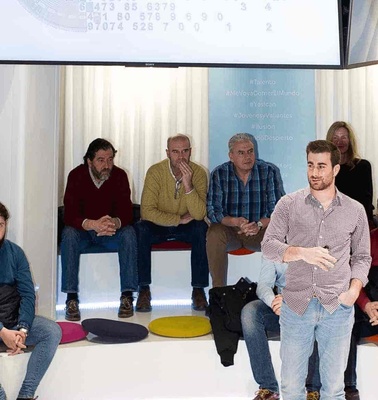
Ignacio Gomá Garcés
With a bachelor’s degree in law and a master’s degree in Legal Consulting for Businesses (LL.M.) from IE Law School, Ignacio Goma has always had a comparative and global understanding of law; he spent time studying abroad at Lazarski University in Warsaw (Poland) and the University of California - Hastings College of Law in San Francisco (California). He’s the author of “¿Qué es realmente Bitcoin?” (“What is Bitcoin, really?”), a book that aims to offer an entertaining diagnostic of the main questions and risks posed by the most famous cryptocurrency in the world.
Currently, Ignacio is a Legal Technical Assistant at the Congreso de los Diputados (Spanish Congress of Deputies) and Deputy Editor for the HD Joven section of Hay Derecho.

"It was all the result of a series of coincidences that started right here at IE Law School."
We interviewed Ignacio so that he could tell us more about his book.
What are cryptocurrencies?
The definition one gives actually depends on the purpose of the definition itself. In general terms or, lets say, colloquial ones, Bitcoin must be considered a cryptocurrency. However, just as the Central European Bank warned in 2015 in a report titled “Virtual Currency Schemes. A further analysis,” Bitcoin must be considered a digital representation of value. For civil purposes, for example, it could be considered a digital movable asset.
How did you become interested in Bitcoin? What drove you to write this book?
It was all the result of a series of coincidences that started right here at IE Law School, while I was doing the Master in Legal Consulting for Business. There was the possibility of doing an optional research project, which was known as “Independent Study,” and I proposed research on “electronic recruitment” to the school. They told me that it was interesting, but that the topic was too broad. I thought about how to shorten it as the deadline to present a new proposal drew nearer. Then, during a family lunch, my father suggested that I dedicate my work to studying the judicial implications “of a new currency that has recently been released, which a lawyer who comes every now and then to my notary talks a lot about.” That lawyer is now the author of my book’s prologue.
What happened is that, little by little and unsuspectingly, new opportunities began to arise until, finally, Editorial Rasche offered me the chance to publish a book based on the work published at IE Law School. And, of course, I accepted. Last January I published a book entitled “¿Qué es realmente Bitcoin?”
What are the biggest legal challenges that are being resolved with regard to Bitcoin? And blockchain? What solution do you propose?
Practically all of them. As a lawyer, I consider the most important and urgent challenges to be the prevention of money laundering, fiscal evasion and consumer protection. Taking shelter in the (relative) anonymity that these new technological phenomena provide, many people launder money that comes from illegal activities, and many others avoid paying taxes. In addition, investment in these cryptocurrencies from consumers who lack appropriate knowledge can lead to undesirable results, with which this country has already been forced to deal with for the last decade. I believe that public administrations should resolve these issues as quickly as possible, with the goal of avoiding greater damage in the future that could also, with some bad luck, end up becoming their responsibility.
On the other hand, the challenges presented by blockchain are, at this time, incalculable. Difficult issues arise from this powerful technology from a judicial point of view (and more will arise in the future). What is a smart contract (is it really a contract)? What are the ICOS and what regulations must be applied to them? In what way can the famous chain of blocks be of great use for bank payment services?
In your opinion, what country is at the forefront of Bitcoin legislation and regulation? Why?
In general, Bitcoin regulation is not very advanced in any country in the world. I believe that it’s more appropriate to distinguish between a permissive or restrictive type of regulation in each country. Australia and a large part of Europe are certainly tolerant of this cryptocurrency, while other countries like Russia, China, Venezuela and Bolivia restrict or even prohibit the use of Bitcoin. I do think that the United Kingdom is focusing these new technologies intelligently. It’s promoting their investigation by qualified investors and in collaboration with the administration, through the known sandbox mechanisms, which allow for the creation of a safe environment in which to experiment. This formula, in my opinion, allows for a cautious investigation of this technology’s virtues, without transferring its inherent risks to consumers and without having to impede entrepreneurship.
Where do you see Bitcoin in the next 5 years?
Although I find it incredibly hard to choose between the different scenarios that I believe are possible, my impression is that blockchain’s technological potential—along with the enormous amount of competition that’s emerging in the unstable market of cryptocurrencies—will translate into a considerable loss of interest in Bitcoin from users.
WANT TO RECEIVE MORE INFORMATION ABOUT THIS PROGRAM?
WANT TO RECEIVE MORE INFORMATION ABOUT THIS PROGRAM?